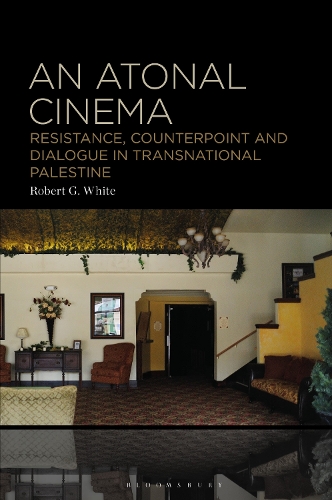
An Atonal Cinema: Resistance, Counterpoint and Dialogue in Transnational Palestine
(Paperback)
Available Formats
Publishing Details
An Atonal Cinema: Resistance, Counterpoint and Dialogue in Transnational Palestine
By (Author) Robert G. White
Bloomsbury Publishing PLC
Bloomsbury Academic USA
23rd January 2025
United States
Classifications
Professional and Scholarly
Non Fiction
Performing arts genres: film, television, radio, and theatre
791.430899275694
Physical Properties
Paperback
196
Width 150mm, Height 226mm, Spine 14mm
280g
Description
This is a book about Palestinians elsewhere and Palestinian elsewheres. Articulating an ambiguous right to remain out-of-place as a spatialized response to the fossilized present, the films and filmmakers in this book examine Palestine, as a place and idea, from the dissonance of exile. An Atonal Cinema: Resistance, Counterpoint and Dialogue in Transnational Palestine theorizes a transnational consciousness within contemporary Palestinian cinema as one which articulates an atonal cinema, utilizing contrapuntal dialogue as a mode of resistance with which to respond critically to the place-myth of Palestine in films produced within Palestine but without Palestinians. Drawing on a genealogy of Edward Saids atonal thinking of counterpoint, I argue that the films in this book display a double-consciousness, through which Palestine is simultaneously elided and re-inscribed in a contrapuntal dialogue between the here of its contemporary reality and the elsewhere of its historical image. An Atonal Cinemas radical approach includes cinematic texts from Europe, South America and Israel in its corpus, which have both triggered and been shaped by critical responses in contemporary Palestinian Cinema. Drawing on both literature and cinema, An Atonal Cinema draws on the work of Edward Said, Mahmoud Darwish, Jean Genet and Carlo Levi. Films by Pier Paolo Pasolini, Jean-Luc Godard, Menahem Golan and Miguel Littn are read contrapuntally through contemporary responses from Ayreen Anastas, Basma Alsharif, Mohanad Yaqubi, Elia Suleiman and Kamal Aljafari.
Reviews
Using Edward Said's writings about music and exile to launch a theorization about the contrapuntal voice in Palestinian diasporic cinema, this book calls into question the very terms of the diasporic and exilic in the Palestinian context. Robert G. Whites rigorous yet easy to read prose is deeply informed by the preceding and current literature on Palestinian cinema, the history of Palestine, and the history of modern philosophy to the present, while maintaining a critical eye on the dissonance and gaps between this latter field and his objects of study. Within the pages of one book, we journey from Saids responses to Jean Mohrs photographs about Palestinian refugees in After the Last Sky to Godard's and Genet's critical works on the Palestinian revolution, and Pasolini's essay film, Sopralluoghi in Palestine [Location Scouting in Palestine], to place in relief the films of the pre-Nakba Palestinian/Chilean Miguel Littin, and the films of Elia Suleiman, Kamal Aljafari, Mohaned Yaqubi, Ayreen Anastas and Basma Alsharif. White's assertion that the contrapuntal voice and the resistance of image distinguishing these filmmakers challenges the history and concept of partition in Palestine-Israel and fills a gap in contemporary studies of Palestinian cinema. * Samirah Alkassim, Assistant Professor of Film Theory, George Mason University, USA *
Not the image of resistance, but the resistance of image. Unfolding this premise across a montage of colonial geographies that spans the globe, Robert Whites Atonal Cinema is also an atopic and anachronic cinema, moving on the margins of time and place in search of an image perpetually deferred, displaced, buried, or blurred. Wide-ranging yet concise, Whites deft readings bring these interstices, elsewheres, and beyonds into sharp focus, orchestrating a multifaceted and multidirectional dialogue that resonates in a shared space of cosmopolitan connections. * Henrik Gustafsson, Professor of Film, Media, and Visual Culture, The Arctic University of Norway, Norway *
Author Bio
Robert G. White is a lecturer in Media and Communication at Kingston University, UK. His research explores the intersection of film, critical theory and geopolitics. He is the co-editor of Spaces of Crisis and Critique: Heterotopias Beyond Foucault (Bloomsbury, 2018). His research has also been published in Film Criticism, RCL and the Journal of Italian Cinema and Media Studies.
